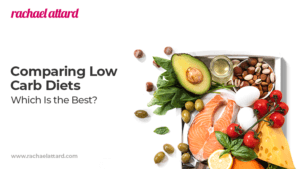Is the Mediterranean Diet Good for Weight Loss?
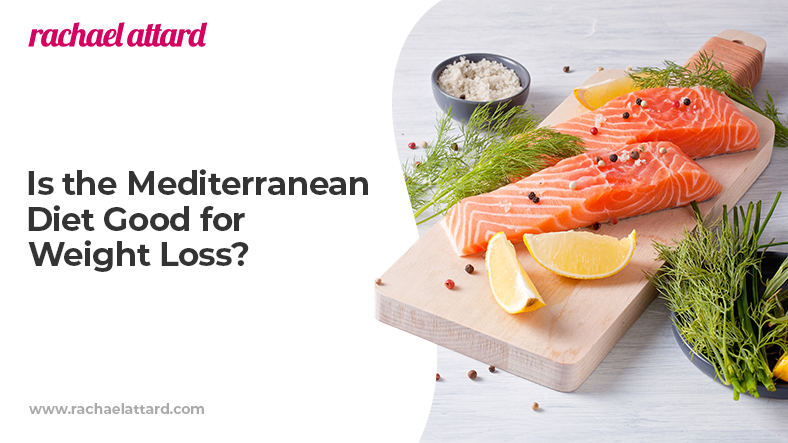
The Mediterranean Diet is known for being a heart-healthy diet that is also delicious. In fact, many celebs, including Gal Gadot, Belle Lucia, Penelope Cruz, and Adele, follow the Mediterranean diet or diets very similar to it.
Because of its popularity, lots of you have asked me if the diet is good for weight loss and general wellbeing.
What Is the Mediterranean Diet?
The Mediterranean Diet is all about following the dietary habits of people living in countries that border the Mediterranean Sea, including France, Greece, Italy and Spain.
People in this region tend to eat whole foods, lots of fruits and vegetables, healthy fats, and fish. They limit their consumption of red meat, sugar, and dairy products.
The Mediterranean diet was not meant as a weight loss diet. Instead, it was developed to improve living habits and general health. Some studies have shown that people in the Mediterranean region tend to live longer, experience better heart health, and have lower rates of disease than people in other regions, and so the diet tries to mimic their general ways of eating.
However, because of this, there aren’t any hard and fast rules about the diet. People who follow this diet try not to think about it as a dieting technique. They prefer to view it as part of their lifestyle. Because the diet is relatively moderate and adjustable to an individual’s needs and preferences, it tends to be sustainable for people long term.
RELATED POST: How to Have a Healthy Relationship With Food
How Does the Mediterranean Diet Work?
In general, the diet emphasises eating:
- Lots of fruits and vegetables
- Plenty of legumes and beans
- Whole grains
- Healthy fats, including oils, nuts, and avocados
- Some dairy and fish
- Occasional white meat
- A small amount of red meat
- A small amount of sugar
- Some eggs
- The occasional glass of wine (some people will drink more than others on this diet)
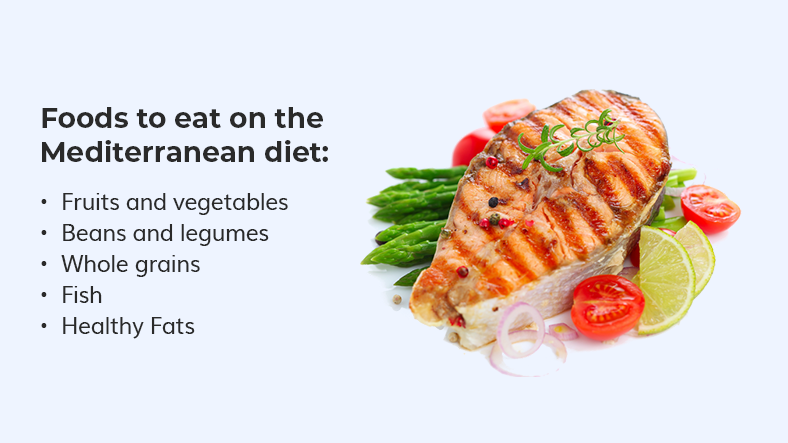
Foods to Eat on the Mediterranean Diet
People who follow the Mediterranean diet tend to eat these foods very frequently. In general, they’ll eat them at least several times a week, if not every day.
Fruits and vegetables: Make up the core of the Mediterranean diet, and they should be a part of most meals and snacks that people on the diet eat. Unlike some high-fat diets, like keto, people on the Mediterranean diet don’t count carbs or other macronutrients. They can eat as many fruits and veggies as they want!
Experts suggest people on this diet try to fill their plate with the rainbow. Picking plants of different colors ensures that you’re getting enough variety. Yum!
Beans and legumes: These also play a big role in the Mediterranean diet. They are full of fiber and often are in high in protein, which tends to help people feel fuller for longer.
Whole grains: Although you shouldn’t be eating a lot of processed carbs on this diet, you can (and should!) eat whole grains. Brown rice, whole wheat pasta, whole wheat breads, and quinoa are just some of the recommended grains.
Fish: People on this diet tend to eat fish at least twice per week, but that depends somewhat on your own nutritional needs and location.
Healthy fats: Nuts, olive oil, avocado, avocado oil, and other monosaturated fats are very important in this diet. Many people will include olive oil in almost every meal.
The Mediterranean diet can be modified to work for different people depending on their budget, spending habits, lifestyle, and taste preferences. However, here are some sample dishes for each meal of the day:
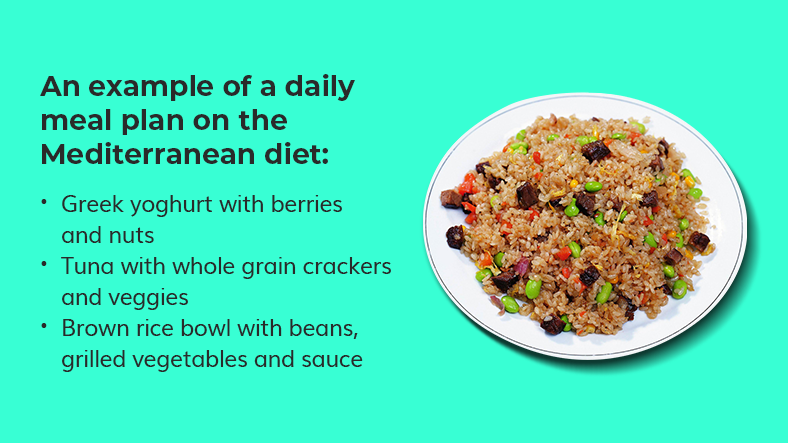
What to Eat for Breakfast on the Mediterranean Diet
- Greek yoghurt with berries and nuts
- Oats with nuts, dates, and honey
- One egg with spinach and mushrooms
- Whole-grain toast with avocado
People on this diet can drink tea and coffee, but they should limit the amount of artificial flavouring and sugar they add to their beverages. Typically, fruit juices like orange juice are also very high in sugar, and they should also be kept to a minimum.
RELATED POST: Is Coffee Good for You and Can It Help With Weight Loss
What to Eat for Lunch on the Mediterranean Diet
- A sandwich on whole grain bread with vegetables, avocado, and hummus
- Salad with an olive oil dressing, nuts, and other veggies
- Tuna with whole grain crackers and veggies
What to Eat for Dinner on the Mediterranean Diet
- A brown rice bowl with beans, grilled vegetables, and a homemade sauce of choice
- Salmon with roasted asparagus
- Whole grain pasta with cheese, vegetables, and a small portion of grilled chicken
Some people on the Mediterranean diet like to drink a glass of red wine with dinner. However, others choose to not drink at all or to do so sparingly. Typically, if people choose to drink alcohol, they pick red wine.
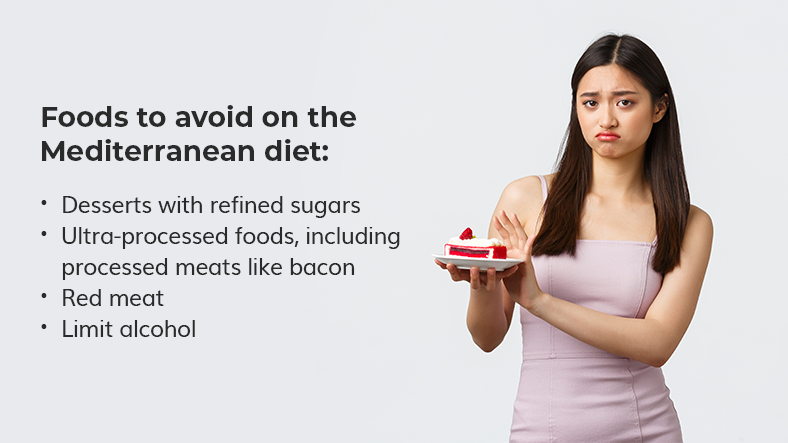
Foods to Avoid on the Mediterranean Diet
This diet isn’t overly strict, and it doesn’t ban any one food group or food type. In general, all foods are allowed on this diet in moderation. If you have a treat that you really enjoy, you can still eat a little bit of it.
However, while following the Mediterranean diet, it is important to limit:
- Alcohol (except red wine)
- Desserts with refined sugars
- Ultra-processed foods, including processed meats like bacon
- Red meat
Some people on the Mediterranean diet will follow an 80/20 rule or something similar to this. They eat the recommended foods about 80 percent of the time, and then they eat the to-be-avoided foods the remainder of the time.
RELATED POST: Why I Follow the 80-20 Rule
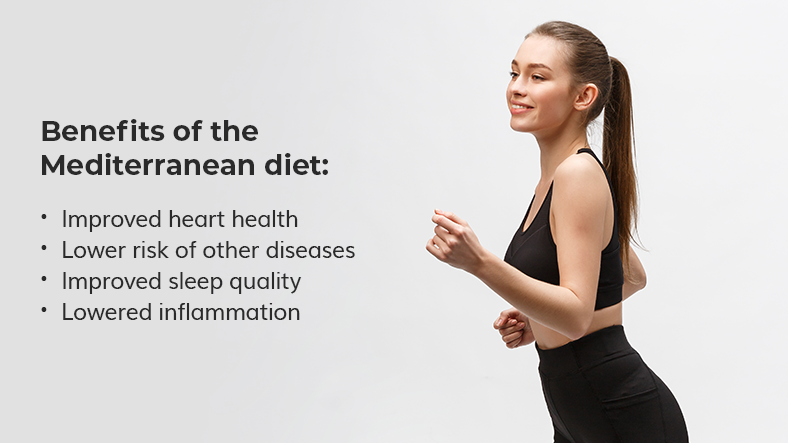
Benefits of the Mediterranean Diet
Improved Heart Health
People who follow the Mediterranean diet reduce their risk of heart disease, partially because the diet helps to lower levels of LDL cholesterol (also known as the “bad” cholesterol).
One study followed people on this diet for five years. People on the Mediterranean diet were 30 percent less likely to experience cardiovascular issues, including stroke, heart attack, and death, than those in the control group.
Other research suggests that following the Mediterranean diet for just 30 days leads to noticeable improvement in in cholesterol and systolic blood pressure levels, both of which are risk factors for heart disease.
Lower Risk of Other Diseases
People who follow the Mediterranean diet have a lower risk for certain types of cancers, including breast cancer. They also are less likely to get Parkinson’s Disease and Alzheimer’s Disease.
Some experts suggest that the high level of produce, and thus antioxidants, in this diet help contribute to the lower levels of disease. In fact, the average person on this diet eats 9 servings of fruit or vegetables a day! However, researchers are still learning about the relationship between antioxidants and disease.
Offers Protective Effects for Those With Type 2 Diabetes
This diet is often recommended for people with Type 2 diabetes or for those who are at risk for type 2 diabetes.
In one study, people who followed the Mediterranean diet were 52% less likely to develop diabetes over an average of four years than those who were not on the diet.
People who already have Type 2 diabetes also seem to benefit from the diet. One study of almost 1,000 people showed that people who were on the diet long term had lower blood sugar levels and hemoglobin A1C levels (which marks blood sugar control). Some research also suggests that the diet can help the body better regulate insulin.
As always, talk to your doctor or another medical professional if you have health concerns. They’ll be able to help you find a diet that works for your specific medical needs and lifestyle. :)
Improved Sleep Quality
For some people, following the Mediterranean diet helps them sleep better at night. However, this doesn’t appear to be true across all ages. In a study from 2018, older adults (aged 65 and up) noticed an improvement in sleep quality while following the diet, but younger adults did not.
In general, young people should aim for about 7-9 hours of sleep. Eating a healthy diet and getting enough exercise can help you get enough quality sleep.
RELATED POST: What Happens to Your Body When You Don’t Sleep
Lowers Inflammation
Inflammation can be a good thing. It is your immune system’s response to threats, including illness and infection. However, if you are chronically inflamed, you probably experience other negative health side effects, possibly in your gut or joints. Chronic inflammation is also linked to heart disease, cancer, and diabetes.
People who follow the Mediterranean diet for several years (3-5) experience lower levels of inflammation markers.
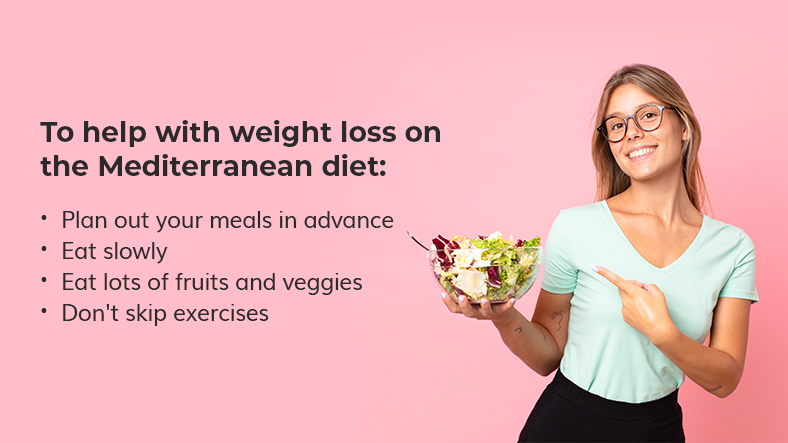
Can the Mediterranean Diet Help With Weight Loss?
The Mediterranean Diet can absolutely help with weight loss! One study showed that people following the diet lost about 4 pounds more on average than those in the control group. They lost even more weight when they combined the diet with exercise, and they had even better results when they stuck with the diet for at least six months.
In another study, people on the diet for two years lost more weight than people who followed low-fat diets, and they were more likely to sustain the weight loss.
Part of the reason the Mediterranean diet helps with weight loss is the fact that it is full of healthy fats, protein, and fiber. All of these help keep you full, and they can help manage your blood sugar. Many people on the diet find that they experience fewer craving for chips, cookies, and similar items.
The diet significantly limits foods that are high in empty calories. For example, eating a bag of chips won’t fill you up, but the calories will quickly add up. By replacing these snacks with foods that are satisfying and full of nutrients, people often end up eating fewer calories than they would otherwise.
RELATED POST: Biggest Diet Mistakes That Are Slowing Down Your Weight Loss
The Diet Can Be High in Calories
Although many people will find that the diet helps them lose weight, some will struggle to lose weight with the diet. The Mediterranean diet doesn’t have a strict set of rules. You don’t count calories or macros, and some people do better with structured diet routines.
Remember, in order to lose weight, you have to have fewer calories in than you do out. Nuts, oils, and other high-fat foods are especially high in calories.
To maximise your weight loss, consider the following:
- Plan out your meals ahead of time. This will help you stick with the diet, instead of ordering take out.
- Eat slowly. Try to enjoy food as you eat it. You’ll have more fun on the diet this way, and you’ll also be less likely to overeat.
- Make sure you’re eating lots of fruits and vegetables. Vegetables are especially low in calories, and they can help fill your plate and keep you full.
- Don’t skip exercise. If you want to lose weight, combine the diet with a good workout plan. If you don’t know where to start, I suggest going on regular walks at a fast pace. :)
- Consider counting calories for a week or two. This will help give you a sense of how many calories you’re actually eating per day on the diet.
Drawbacks of the Mediterranean Diet
Although the Mediterranean diet is full of health benefits, it isn’t without its downsides.
Some of the drawbacks of the diet include:
- Cost. Some ingredients, especially fish, can be expensive depending on where you live.
- Alcohol. The diet generally allows moderate red wine intake, but some people choose to stay away from alcohol all together. In addition to this, alcohol can contribute to numerous health problems.
- It can be high in calories if you’re not careful.
- Some people prefer more structured diets.
- The diet can be challenging to follow if you don’t cook or struggle to make time in the kitchen.
Wrapping Up
For many people, the Mediterranean diet is an excellent option! I love that it encourages people to eat healthy fats, lean protein, lots of veggies, and whole grains. It can be a delicious diet that doesn’t sacrifice flavour for nutrition.
Let me know if you have any questions about the diet. :)
Love Rachael xx




